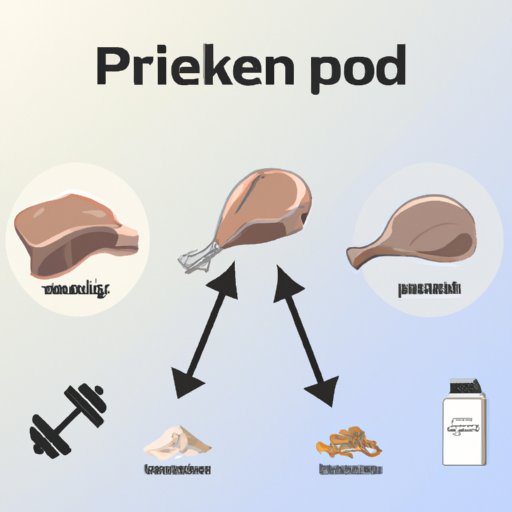Introduction
Proteins are an essential part of a healthy diet. They are made up of amino acids, which are the building blocks of life. Proteins play a vital role in many bodily functions, from muscle growth and repair to energy production and metabolism. Getting enough protein is important for proper growth and development and also helps to support a healthy immune system. Eating a variety of proteins throughout the day can help to reduce hunger and cravings and promote overall wellbeing.
Role of Proteins in Building and Repairing Muscles and Tissues
Proteins are the key nutrient for building and repairing muscles and tissues. When proteins are broken down, they create amino acids that are used to build new proteins. These proteins are then used to form and strengthen muscles, bones, skin, hair, and other connective tissues. Getting enough protein is important for muscle growth and development, as well as for maintaining strength and endurance.
Consuming adequate amounts of protein is essential for athletes and those who engage in regular physical activity. Protein helps to build and repair muscles after exercise, which can help to improve performance and reduce the risk of injury. Eating a balanced diet that includes lean proteins can also help to reduce body fat and maintain a healthy weight.
Energy Production and Metabolism
Proteins are an important source of energy. The body breaks down proteins into glucose, which is then used for energy production. Proteins also play a role in metabolism, aiding the body in breaking down fats and carbohydrates for use as energy. Consuming enough protein helps to keep energy levels up and can help to prevent fatigue.
Proper Growth and Development
Proteins are essential for proper growth and development, particularly during childhood and adolescence. Protein helps to build and maintain bones, muscles, and other tissues, and it is also important for the production of hormones and enzymes. Getting enough protein is also necessary for the absorption of key nutrients such as iron, zinc, and calcium, all of which are important for growth and development.

Impact on the Immune System
Proteins play an important role in maintaining a healthy immune system. Proteins help to produce antibodies, which are vital for fighting off infections and diseases. Eating foods that are high in proteins can help to boost immunity and keep the body strong and resilient. Examples of foods that are high in protein include lean meats, fish, eggs, nuts, seeds, and legumes.

Variety of Proteins Throughout the Day
It is important to get a variety of proteins throughout the day. Eating different types of proteins can provide a greater range of essential amino acids, vitamins, and minerals. It is best to aim for at least three servings of protein-rich foods per day, including one serving with each meal. Examples of proteins to include in each meal include lean meats, fish, eggs, tofu, beans, lentils, quinoa, nuts, and seeds.

Positive Effects of Getting Enough Protein
Getting enough protein has many positive effects on the body. It helps to reduce hunger and cravings, as proteins take longer to digest than carbohydrates and can keep you feeling fuller for longer. Eating a balanced diet that includes plenty of protein can also help to regulate blood sugar levels and support healthy weight management.
Conclusion
In conclusion, proteins are an essential part of a healthy diet. They are important for building and repairing muscles and tissues, providing energy, and supporting proper growth and development. Proteins also help to maintain a healthy immune system and reduce hunger and cravings. To get the most benefits from proteins, it is important to eat a variety of proteins throughout the day. Incorporating lean proteins into each meal can help to ensure that you are getting enough protein for optimal health.
(Note: Is this article not meeting your expectations? Do you have knowledge or insights to share? Unlock new opportunities and expand your reach by joining our authors team. Click Registration to join us and share your expertise with our readers.)
